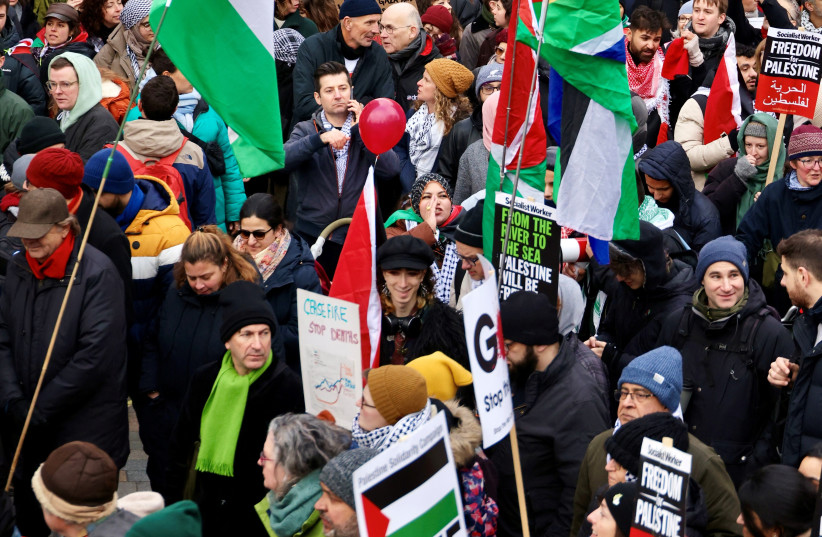More than 100 days after the Hamas terrorist attack in Israel, why do Jewish Americans feel unsafe? It’s because we’ve seen this before. For many, criticism of Israel is used as cover for antisemitism.
After Hamas fired rockets into Israel in 2021, leading to more than two weeks of conflict, domestic antisemitism increased.
When suicide bombers killed more than 1,000 innocent Israelis during the Second Intifada in the early 2000s, domestic antisemitism rose.
This month, a high school basketball game in Yonkers, NY, was cut short after one player screamed at her opponent, “I support Hamas, you f**king Jew!” Postcards with antisemitic imagery and the phrase “the Holocaust never happened, but it really should have,” were sent to the city council in Newburyport, MA. And in East Rutherford, NJ, a Jewish teen was harassed by a stranger screaming, “You’re a whore, your mother’s a whore, your grandmother’s a whore,” and “Free Palestine!”
Jews face antisemitism around the globe
Irish diplomat and historian Conor Cruise O’Brien once remarked that antisemitism is a light sleeper. He was right. Unless you believe that legions of people suddenly became antisemites post-October 7, we must assume that their latent antisemitism simply found a pretext to surface.

There were pro-Hamas protests and anti-Israel screeds before Israel’s defensive military actions. The burned homes in Kibbutz Be’eri, Nir Oz, and Kfar Aza were still smoldering and the blood on the field at the Supernova music festival was not yet dry when antisemites used murdered Israelis to taunt and intimidate the living.
So-called activists tore down posters of the kidnapped – dehumanizing all those who were brutally taken from their homes by Hamas terrorists.
It’s no wonder that a new American Jewish Committee (AJC) survey found that an alarming 78% of American Jews who heard anything about Hamas’s attack are feeling less safe. “I am shocked by the sizable vocal minority that is supporting Hamas. In many ways, I don’t feel comfortable living in my country for the first time in my life,” said one respondent.
Another shared that a local Jewish organization planned to reschedule a children’s outdoor activity because a “walking trip around town no longer felt safe.”
In the 10 largest US cities, Jews are now the most-targeted group following a surge of anti-Jewish hate crimes this fall. One expert predicts the FBI’s 2023 hate crimes report will likely show a record number of anti-Jewish incidents.
Understandably, some have taken the painful step of hiding their Jewishness: covering kippot by wearing hats, concealing Star of David necklaces, and even removing mezuzot from their doors.
HERE IS my message to the Hamas supporters next door: While our community must protect ourselves, we will not be pushed into hiding. Our Jewish identity cannot be defined by antisemitism and our response to it. We are not defined by those who hate and target us.
Regardless of what is happening around us, we can find strength and unity in our Jewish community. We are seeing right now how Jews are showing up for one another with planes of supplies and volunteers being sent to Israel to support those on the front lines, to provide shelter and comfort to those who have lost their homes, and to bolster those who have faced unimaginable horror.
We continue to loudly call on the global community to ensure the safe return of every hostage – and we will not stop until they are reunited with their families.
In November, I traveled to Israel with members of AJC’s Executive Council and Board of Governors. We carried with us a message of unity and support from the entire US Jewish Diaspora. We had the honor of hearing from the families of Kfar Aza who painfully shared with us not only their harrowing experiences but also their unbreakable spirit. I remain inspired by their strength and resilience.
As we pass 100 days since October 7 and come together in our collective mourning, we also come together in collective Jewish pride. We stand for those who can no longer stand for themselves, we fight for those who need our protection, we gather for those who no longer have that privilege, and we speak for the hostages whose voices must be heard.
As President Isaac Herzog told AJC last year: “I am adamantly passionate about the story of the Jewish people. We are a small nation of about 15 million plus Jews around the globe. And in a sea of 8 billion human beings, we have a role to play, we have a story, and therefore we should protect and preserve the unity of our people amidst all of its differences.”
Am Yisrael chai – the people of Israel live.
The writer, a former US congressman from Florida, is the CEO of the American Jewish Committee (AJC).
